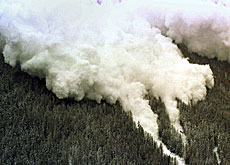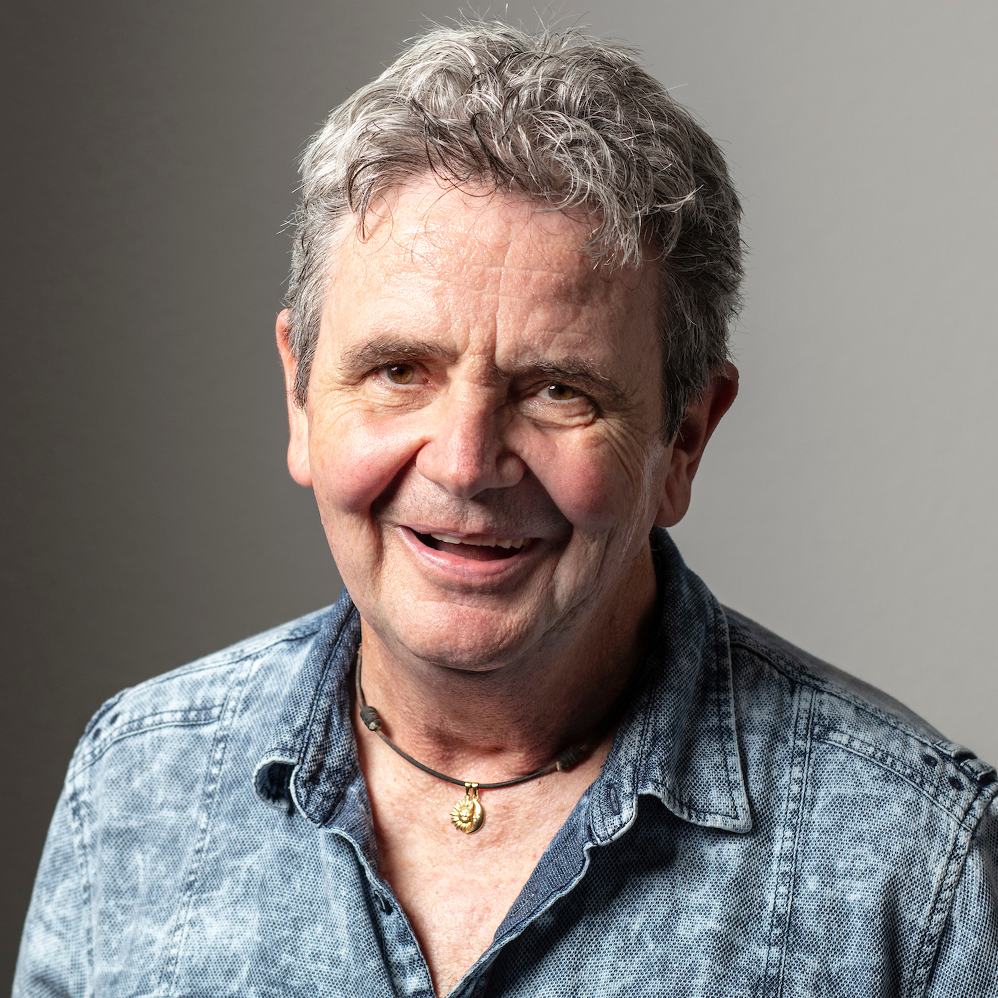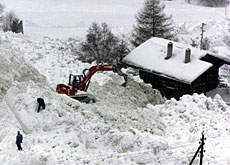Mountain guides deplore avalanche verdict

Mountain guides have warned of a dangerous precedent after a court found two men guilty of taking insufficient precautions before an avalanche struck.
They argue that it is impossible to predict the force and direction of all avalanches and that individuals should not be held to account for unexpected acts of nature.
The warning comes after a district judge in Sion in southwestern Switzerland last week handed out suspended prison sentences to two men accused of manslaughter over the deaths of 12 people.
They were killed when avalanches swept through the alpine village of Evolène six years ago.
The defence argued that the men could not have predicted that the avalanches would descend as far as the village.
But the argument did not wash with the presiding magistrate, who concluded that the former head of Evolène’s village council, Pierre-Henri Pralong, and mountain guide André Georges could have done more to warn and protect people.
Questioning the verdict
Charly Wuilloud of the Forest and Landscape Division in canton Valais says they should never have been found guilty.
“As a mountain guide myself, all I can say is that there are still some unknowns when it comes to nature,” he said.
“What happened in Evolène could not have been predicted. And when something unexpected happens, you cannot accuse people of not having done their job properly.”
During the trial the defendants argued that they had taken the precaution of closing roads and checking an empty chalet located in a high-risk zone.
Robert Bolognesi, the director of a foundation which specialises in the prevention of avalanches, does not believe they broke the law.
“On that particular day, chalets were closed and areas at risk were evacuated. But nobody could have imagined that the snow would fall as far as it did. The avalanche reached further than the [danger] zone marked on maps,” he said.
Dismay
There was indignation and dismay in Evolène itself after the guilty verdict was announced.
One local resident told Swiss television that the search for a scapegoat was like “trying to find the people responsible for the… tsunami in southeast Asia.”
“People [in Evolène] are quite simply disgusted by what’s happened,” said Bolognesi.
“They have witnessed two bombshells. First, when nature made its voice heard, and a second time after the judge delivered his verdict. It’s no wonder that the local people are struggling to understand what’s happened.”
More than 120 mountain communities in canton Valais are in areas deemed to be at risk from natural disasters, including avalanches, mudslides and flooding.
Every one of these communities – as well the cable-car companies operating in affected areas – employs somebody to monitor the danger and take the necessary safety precautions.
The job is considered to be dangerous and comes with a salary of up to SFr15,000 ($12,700) for each winter season.
Future prospects
Bolognesi fears that the Evolène trial could make individuals think twice before they agree to take on such work in future.
“This whole network of people, many of whom get up at four in the morning to clear avalanches, only works because they really believe in what they are doing and because they want to do a good job,” he said.
“But how can you carry on, knowing that one day you could end up in a courtroom on the wrong side of the law?”
Wuilloud takes a different view. He believes that most mountain guides and safety experts will not be put off by the threat of legal action.
“We are talking about people who know how to do their job… they receive training and study the movement of the snow mantle throughout the year.
“You have to live with and accept that unknown factor. Because [at the end of the day] you can’t control everything.”
swissinfo, Marc-André Miserez
Timeline:
February 1999: Two unusually heavy avalanches hit the alpine village of Evolène, killing 12 people.
May 2000: Legal proceedings are launched against the head of Evolène’s village council, Pierre-Henri Pralong, and mountain guide André Georges.
February 2005: Six years after the avalanches struck the village, a district court finds both men guilty of manslaughter. They receive suspended prison sentences.

In compliance with the JTI standards
More: SWI swissinfo.ch certified by the Journalism Trust Initiative


You can find an overview of ongoing debates with our journalists here. Please join us!
If you want to start a conversation about a topic raised in this article or want to report factual errors, email us at english@swissinfo.ch.